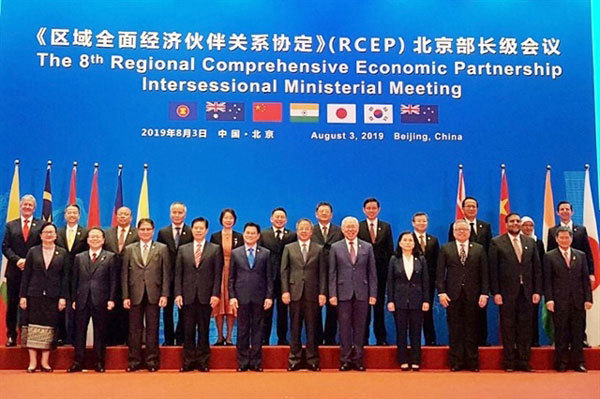 |
| Deputy Minister of Industry and Trade Tran Quoc Khanh (second row, fourth left) poses for a photo with other participants at the 8th Regional Comprehensive Economic Partnership (RCEP) Intersessional Ministerial Meeting which took place in Beijing, China. — VNA/VNS Photo Luong Tuan |
The Vietnamese delegation made several proposals to solve outstanding difficulties in negotiations towards the target of completing negotiations by the end of this year.
Participants agreed to strive for the completion of negotiations on market opening and all the most important content of the deal's wording by the end of 2019 while intensifying efforts towards the signing of the deal in 2020 in Vietnam when it assumes the role as the ASEAN Chair.
At the meeting, ministers stressed that trade remains an effective tool to generate jobs and income, and foster productivity, technology development, and sustainable and inclusive growth.
The RCEP region, which accounts for 47.4 per cent of the world population, 29.1 per cent of global trade and 32.5 per cent of investment flows, plays an important role in regional trade and backs an open, inclusive and rule-based trade system.
Delegates welcomed the conclusion of negotiations on Appendixes on Telecoms, Financial and Professional Services, while acknowledging positive progress in negotiations of remaining issues.
On the sidelines of the meeting, the Vietnamese delegation held bilateral meetings with officials from the Republic of Korea, Japan and Australia to discuss directions to solve bottlenecks in negotiations and boost bilateral cooperation.
Initiated in 2012, RCEP is a free trade agreement involving 10 ASEAN member countries, namely Brunei, Cambodia, Indonesia, Laos, Malaysia, Myanmar, the Philippines, Singapore, Thailand and Vietnam; and the ASEAN's six dialogue partners – China, Japan, Australia, New Zealand, India and the Republic of Korea.
VNS
 Deputy Minister of Industry and Trade Tran Quoc Khanh led a Vietnamese delegation to attend the 8th Regional Comprehensive Economic Partnership (RCEP) Intersessional Ministerial Meeting which took place in Beijing, China, on Saturday.
Deputy Minister of Industry and Trade Tran Quoc Khanh led a Vietnamese delegation to attend the 8th Regional Comprehensive Economic Partnership (RCEP) Intersessional Ministerial Meeting which took place in Beijing, China, on Saturday.